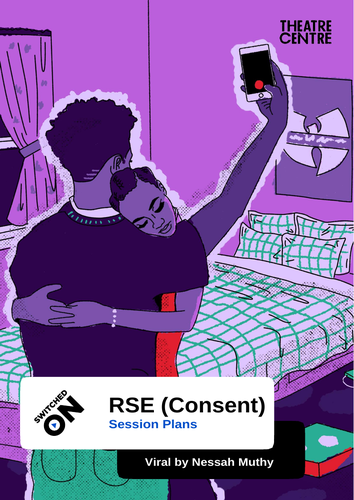




What are Switched On toolkits?
Teaching resources for engaging PSHE lessons at KS3 and KS4. This specific scheme of work is most suitable for Year 9. We have had feedback that it has also been used successfully with KS4.
In your Switched On Toolkit you will find:
- Short professional radio play
- 4 hours of lesson plans
- Student work booklet to help guide the learning
- Powerpoint
- Guidelines for creating a safe space for teaching consent
As a Theatre Company for young people, we specialise in using realistic third-person scenarios to open up safe discussions about difficult subjects. Each scheme of work is centered around a professional radio play. This toolkit contains teaching resources for RSE (Consent).
The unit of work begins by allowing the class to listen to a short radio play about consent. The play is a modern piece written by contemporary writer, Nessah Muthy. This play was specifically written for use in the PSHE classroom. The characters are fictional, and yet the situations explored are very realistic and relatable for a young audience.
Viral, by Nessah Muthy, sparks conversation and develops understanding around consent for Year 9+. In the audio play, the protagonist, Paige, is 15 years old and is experiencing conflicting feelings around intimacy within her new relationship. A preview of the play is available on Theatre Centre website on the listed product page.
This scheme of work covers the following aims:
• Relationships Strand
• To establish clear personal boundaries around those aspects of their lives they wish to be private, shared only with specific people, and made public. To understand their right to privacy
• Understand that consent is freely given and that being pressurised, manipulated or coerced to agree to something is not consent; that the seeker of consent is responsible for ensuring that consent has been given and if consent is not given or is withdrawn, that decision should always be respected
• Understand the law in relation to consent (including the legal age of consent for sexual activity, the legal definition of consent and the responsibility in law for the seeker of consent to ensure that consent has been given)
• Understand the importance of seeking the consent of another person and how to be sure that consent has been given; how to assertively withhold or withdraw consent
Something went wrong, please try again later.
This resource hasn't been reviewed yet
To ensure quality for our reviews, only customers who have purchased this resource can review it
Report this resourceto let us know if it violates our terms and conditions.
Our customer service team will review your report and will be in touch.
